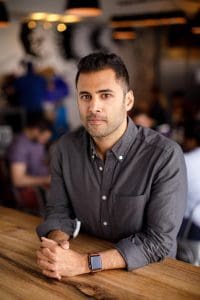 School of Communication alumnus (’98) Ritesh Gupta has collaborated with Roc Nation and Meek Mill to direct a New York Times op-ed film “Meek Mill: Prisoners Deserve a New Set of Rights”. Gupta wanted to emphasize the importance of adversely impacted individuals, such as minorities and the impoverished, by highlighting the need for criminal justice reform and follows the story of rapper Meek Mill.
School of Communication alumnus (’98) Ritesh Gupta has collaborated with Roc Nation and Meek Mill to direct a New York Times op-ed film “Meek Mill: Prisoners Deserve a New Set of Rights”. Gupta wanted to emphasize the importance of adversely impacted individuals, such as minorities and the impoverished, by highlighting the need for criminal justice reform and follows the story of rapper Meek Mill.
“The need for American criminal justice reform is one of the most important issues of our time.” Gupta explains, “So many people, particularly minorities and the impoverished, are adversely impacted by the current process. The need for reform was important to bring to light in a way that registered with a broad audience, so everyone could get behind the need and advocate for reform. The current system had a very public impact on Meek Mill and he has since been an outspoken proponent on the immediate need for reform. When Roc Nation provided the opportunity to help on the film through VaynerProduction and VaynerMedia, I was all in.”
Working on this important project that tackles such a sensitive cultural issue is what pushed Gupta to create this film with the message of the desperate need for reform. He hopes that audiences are able to takeaway the incredible power each individual has to enact change. “A lot of times we think the ability to make change is solely in the hands of the politician.” says Gupta. “But our hope was to empower the people watching to not only understand the human impact, but to understand they have a right to expect better.”
Gupta is currently working in New York City as the Group Creative Director for the full-service digital agency VaynerMedia and credits his successful career to classes he took while at Florida State. “FSU offered me access to so many different areas and different experiences that informed me of what I wanted to do.” remarks Gupta. “Whether it was Seminole Productions with Mark Rodin, or learning advertising from Barry Solomon, or just getting inspired by Mark Zeigler. Not only were the extra-curricular opportunities abundant, but the people there really got behind you to motivate and empower you to want to seek out the world and learn it all.”
Learn more about Ritesh Gupta through the Q&A with him below and make sure to watch his film here.
What has been your favorite part of being involved with this project?
Knowing that we were taking on an issue so important and had an opportunity to really convey the desperate need for reform. Florida recently was at the forefront of rectifying some of those wrongs as the state recently passed Amendment 4 in the past November elections, reinstating individuals with felony convictions the right to vote and making some change. But that was just one step in a broader push to really reform the criminal justice system in the United States.
What do you hope is the biggest takeaway audiences get from this film?
I hope through watching this people were moved to understand that they can be a force of change to demand a new set of rights. The right to speak up and be a part of a positive social movement. A lot of times we think the ability to make change is solely in the hands of a politician or the political system. Our hope was to empower the people watching to not only understand the human impact, but to understand they have a right to expect better.
Best piece of advice you have ever received?
One of my professors years ago – Scott Atwell – once told me: ‘Be careful who’s toes you step on on your way to the top. It will be the same people you see on your way to the bottom.’ It couldn’t be more true. Basically what it means is be humble, be kind, treat people well and understand the person who works for you today, may be your boss tomorrow. Whether we are in film, advertising, finance, insurance or any other field, the way we treat people defines who we are as employees and colleagues. And it’s important to keep a level of humility and respect that even if you’re on top today, you can easily be on the bottom tomorrow. And if you are: who is going to remember you in a way that would make them want to help you?
What would you say to someone who doesn’t know what career they’d like to pursue?
Be open to everything, say no to nothing, and be willing to have your mind changed by the experiences life has to offer. When I left FSU I thought all I ever wanted to be was a sportscaster. Then last month I helped to create a film with someone who had the #1 Album in the country. Who would have thought I’d go from a sports reporter on Doak Campbell to a global stage in the NY Times. But life has a funny way of taking you places you never would know you’d end up. To students and young people everywhere — worry less, live more, and love the journey. It’s a helluva ride.

